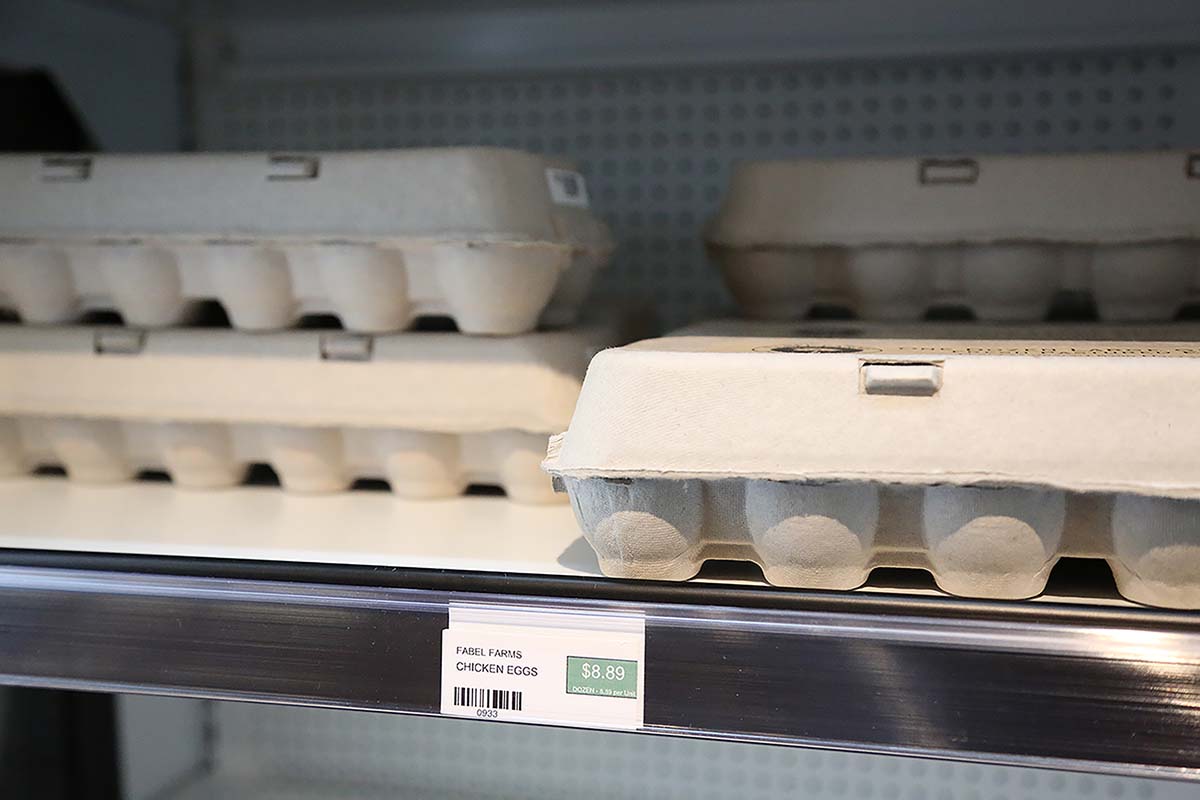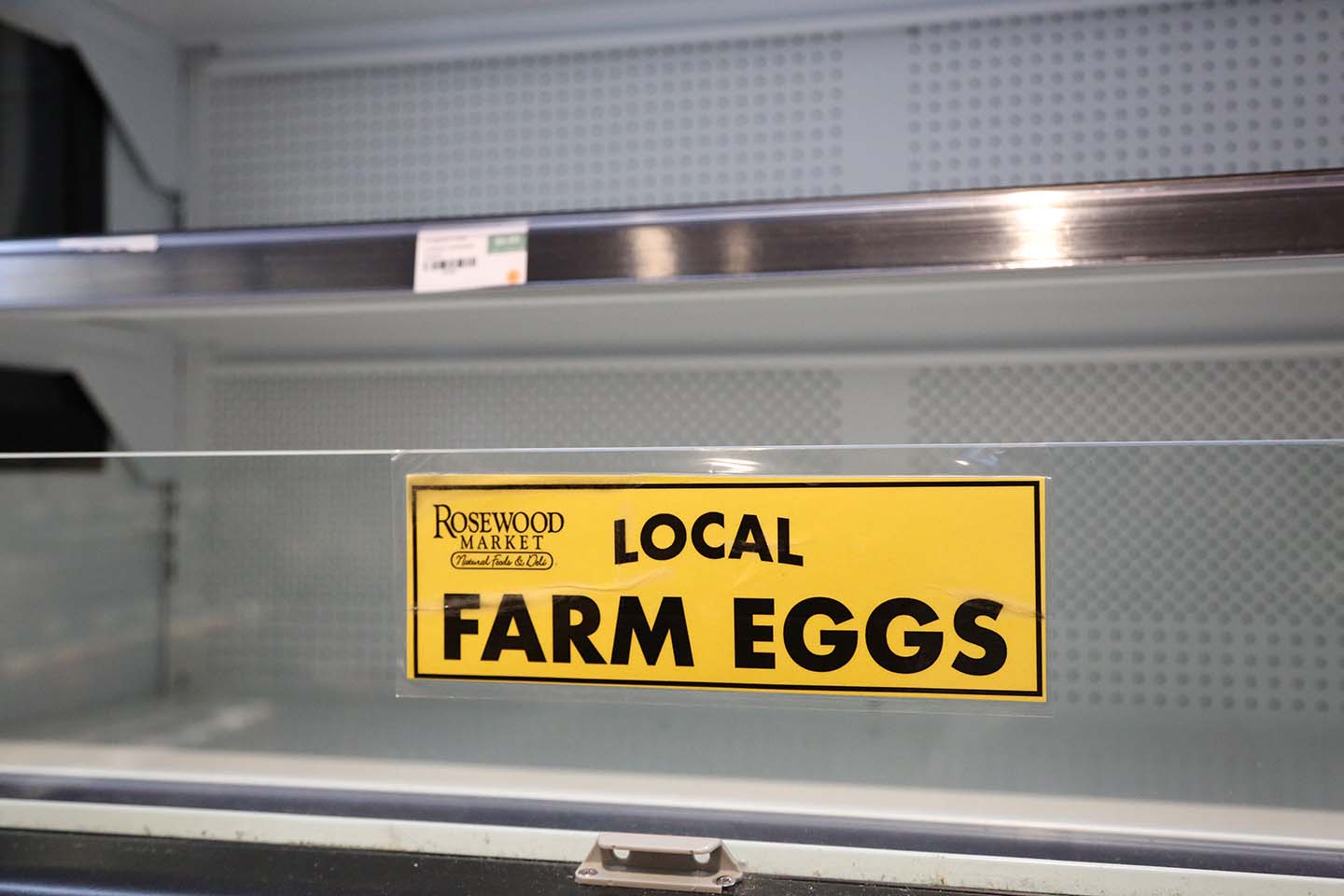Outbreaks of bird flu are causing egg shortages and higher prices in America. (Photos by Nat Campbell/Carolina News & Reporter)
Fewer eggs are reaching grocery stores as bird flu hits farms across the country.
Both big and small farms have had to adapt how they deal with the virus to ensure they are producing healthy eggs. The virus has caused the egg supply to decrease, making eggs hard to find and more expensive to buy.
That has taken a toll on large grocery store chains, such as Publix.
“Like many retailers, we are experiencing shortages on eggs due to the Avian Bird Flu (HPAI), which has created a rise in egg demand,” Jared Glover, the media relations manager for the Florida-based Publix said in an email. “As a result, items in this section have limited availability.”
How did the virus spread?
Highly Pathogenic Avian Influenza is always around. But it’s worse this year because of the rise of the H5N1 strain, said Kayln Reed, national sales manager for Alzchem, a specialty chemicals company based in Germany, who works with chicken feed additives.
The FDA website states that while the virus initially affects the birds, it is also a danger to humans because it can be transmitted when they eat eggs.
There are different levels of risk from consuming the meat of the bird and the eggs. Eating eggs, not meat, is more dangerous, Reed said.
The virus is highly contagious in the birds.
When one bird in a flock gets the disease, the whole flock is bad, and the eggs from it cannot be taken to a grocery store.
As soon as one bird tests positive for HPAI, the whole flock has to be killed, Reed said.
That means the farms need to make sure the environment the chickens are in is heavily controlled to prevent any kind of disease from coming in.
It takes a long time for farmers to replenish lost birds when too many of the layer-bird flock is infected. It simply takes a long time before the new birds reach the age at which they can begin laying, Reed said.
“It’s kind of that supply and demand,” Reed said. “But they have to plan these (supply and demand) flops years in advance.”
Demand for eggs, meanwhile, has stayed the same, meaning grocery stores have to raise their prices to make money, said McKinley Blackburn, a professor of economics at the University of South Carolina.
“So I think people still buy the eggs, and so that’s why the egg prices are going up so much,” Blackburn said.
While large farms are struggling, the epidemic has been a great opportunity for small and local farms, such as Eden Farms, located in Marietta, South Carolina.
“Our phone rings daily, much more than in the past, from people looking for the first time for local products. We can’t keep up!” said Adam Shumate, a farmer at Eden Farms. “We’ve also seen orders becoming larger with some choosing to stock up.”
They might be able to better manage the disease within their flock because of their smaller size, Shumate said.
“We ensure that we have dedicated shoes, equipment, etc., that never leaves the farm or has the potential to come in contact with outside viruses,” he said. “We also ensure that migratory birds or other wild animals stay clear of our farm animal’s containments to avoid transmitting from that source.”
While some egg suppliers may be having an easier time than others, healthy eggs are the top priority for everyone.
“We feel a happy and healthy chicken is a tasty chicken,” Shumate said.
ABOUT THE JOURNALISTS

Morgan Dunn
Dunn is a junior journalism and political science student at the University of South Carolina. She has interned for Hannah News, covering the state Legislature. She has written for The Daily Gamecock since her sophomore year, serving one semester as opinion editor and now working as a reporter. Her career goal is to become a political reporter.

Nat Campbell
Campbell is a sophomore journalism student at the University of South Carolina. She has been working as an assistant news editor for the student-run Daily Gamecock for the past two semesters. She hopes to pursue a career as an arts and culture journalist with a focus on film.




